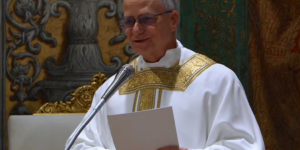Should We Cut These Verses About Unity Out of Our Bible?
If there is one thing that seems spiritually certain it is that the church will always be divided. Our factions and differences and divisions seem as fixed as the rising of the sun. Yet the Bible speaks of a day when we will all come together in the unity of the faith. How can this possibly be true?
To be clear, when I speak of “the church” I’m not speaking of all who profess to be followers of Jesus. I’m speaking of those who are genuine believers, those whom God considers to be His sons and daughters, those who have been truly redeemed.
But the truth be told, even in our local assemblies there is often massive disunity, let alone in the various assemblies within our community, let alone in our city or state or country, let alone the whole world. How can there possibly be even a semblance of unity? It really does seem impossible and far-fetched.
Yet Paul himself wrote these words: “So Christ Himself gave the apostles, the prophets, the evangelists, the pastors and teachers, to equip His people for works of service, so that the body of Christ may be built up until we all reach unity in the faith and in the knowledge of the Son of God and become mature, attaining to the whole measure of the fullness of Christ” (Ephesians 4:11-13, my emphasis).
Yes, this is something that is supposed to happen in this world, before the Lord returns, as opposed to something that will happen after He returns, when we will have shed our fallen humanity.
As Paul continued, “Then we will no longer be infants, tossed back and forth by the waves, and blown here and there by every wind of teaching and by the cunning and craftiness of people in their deceitful scheming. Instead, speaking the truth in love, we will grow to become in every respect the mature body of Him who is the head, that is, Christ. From Him the whole body, joined and held together by every supporting ligament, grows and builds itself up in love, as each part does its work” (Ephesians 4:14-16).
Paul wrote these words as if this was an attainable goal, something that we should work towards. Yet how many of us even give this much thought, let alone believe for it to happen, let alone do our best to make it happen?
To be sure, Paul is not speaking of some kind of sloppy, compromised, watered-down, ecumenism. Not is he speaking of putting on a veneer of unity for ulterior purposes, like a religious coalition with the goal of sharing power. To the contrary, it is an integral unity, a transcendent unity, a unity that comes about as a result of our unity with the Lord, even in the midst of our diversity and human differences.
As Jesus Himself prayed, “My prayer is not for them alone. I pray also for those who will believe in Me through their message, that all of them may be one, Father, just as You are in Me and I am in You. May they also be in Us so that the world may believe that you have sent me. I have given them the glory that You gave Me, that they may be one as We are one—I in them and You in Me—so that they may be brought to complete unity. Then the world will know that you sent Me and have loved them even as You have loved Me.” (John 17:20–23)
If there is one thing that seems spiritually certain it is that the church will always be divided. Our factions, differences and divisions seem as fixed as the rising of the sun. Yet the Bible speaks of a day when we will all come together in the unity of the faith. How can this possibly be true?
To be clear, when I speak of “the Church” I’m not speaking of all who profess to be followers of Jesus. I’m speaking of those who are genuine believers, those whom God considers to be His sons and daughters, those who have been truly redeemed.
But the truth be told, even in our local assemblies there is often massive disunity, let alone in the various assemblies within our community, let alone in our city or state or country, let alone the whole world. How can there possibly be even a semblance of unity? It really does seem impossible and far-fetched.
Yet Paul himself wrote these words: “So Christ Himself gave the apostles, the prophets, the evangelists, the pastors and teachers, to equip His people for works of service, so that the body of Christ may be built up until we all reach unity in the faith and in the knowledge of the Son of God and become mature, attaining to the whole measure of the fullness of Christ” (Ephesians 4:11-13, my emphasis).
Yes, this is something that is supposed to happen in this world, before the Lord returns, as opposed to something that will happen after He returns, when we will have shed our fallen humanity.
As Paul continued, “Then we will no longer be infants, tossed back and forth by the waves, and blown here and there by every wind of teaching and by the cunning and craftiness of people in their deceitful scheming. Instead, speaking the truth in love, we will grow to become in every respect the mature body of Him who is the head, that is, Christ. From Him the whole body, joined and held together by every supporting ligament, grows and builds itself up in love, as each part does its work” (Ephesians 4:14-16).
Paul wrote these words as if this was an attainable goal, something that we should work towards. Yet how many of us even give this much thought, let alone believe for it to happen, let alone do our best to make it happen?
To be sure, Paul is not speaking of some kind of sloppy, compromised, watered-down, ecumenism. Not is he speaking of putting on a veneer of unity for ulterior purposes, like a religious coalition with the goal of sharing power. To the contrary, it is an integral unity, a transcendent unity, a unity that comes about as a result of our unity with the Lord, even in the midst of our diversity and human differences.
As Jesus Himself prayed, “My prayer is not for them alone. I pray also for those who will believe in Me through their message, that all of them may be one, Father, just as You are in Me and I am in You. May they also be in Us so that the world may believe that you have sent me. I have given them the glory that You gave Me, that they may be one as We are one—I in them and You in Me—so that they may be brought to complete unity. Then the world will know that you sent Me and have loved them even as You have loved Me.” (John 17:20–23)
Will God answer this prayer? And was this merely the Lord’s human desire, or did it reflect the very will of His Father? Surely this prayer reflects the heart of our heavenly Father. Surely He, too, longs to see us united in His Son.
And take careful note of what will happen when we come into this glorious unity: “Then,” Jesus said, “the world will know that you sent Me and have loved them even as You have loved Me.” Talk about shaking the world!
Looking at this through human eyes, it really does seem impossible, like some kind of spiritual pipe dream. Yet the Lord prayed for it and Paul wrote about it, both of them with certainty and expectation.
Unfortunately, our deep lack of unity, our constant fleshly bickering, our sense of competition more than comradery, and our extreme judgmentalism (as opposed to healthy discernment), gives ample testimony to just how far off the mark we really are.
That’s one reason we need to experience corporate revival in a massive, life-changing way. During times of genuine renewal, there is also a great outpouring of love (even in the midst of controversy and misunderstanding). As one old saying goes, when the waters rise, you don’t see the fences anymore.
That’s one reason why revival remains a deep, burning cry of my heart, and one reason why I wrote my latest book Revival Or We Die: A Great Awakening Is Our Only Hope. Revival brings us into a fresh encounter with Jesus the Lord which, in turn, brings us into a greater love for one another.
Persecution can also unite believers, as followers of Jesus find themselves sharing prison cells with other believers from other denominations and expressions, only to realize they are one in the Lord. We may experience more of this in the days ahead.
And always, even without revival or persecution, based on the principles laid out by Paul, above, we can take steps every day of our lives to walk in love towards our brothers and sisters, doing our best to build up rather than simply tear down. There’s even a way to correct error that has the goal of unifying around truth rather than dividing around personalities and doctrines. May we learn to step higher here too.
Decades ago, I heard about how a little girl learned to apply the biblical call to “love one another.” She looked at her friend and said, “I’m one, and you’re another.”
This sounds like a good place to start. {eoa}
Read articles like this one and other Spirit-led content in our new platform, CHARISMA PLUS.






































